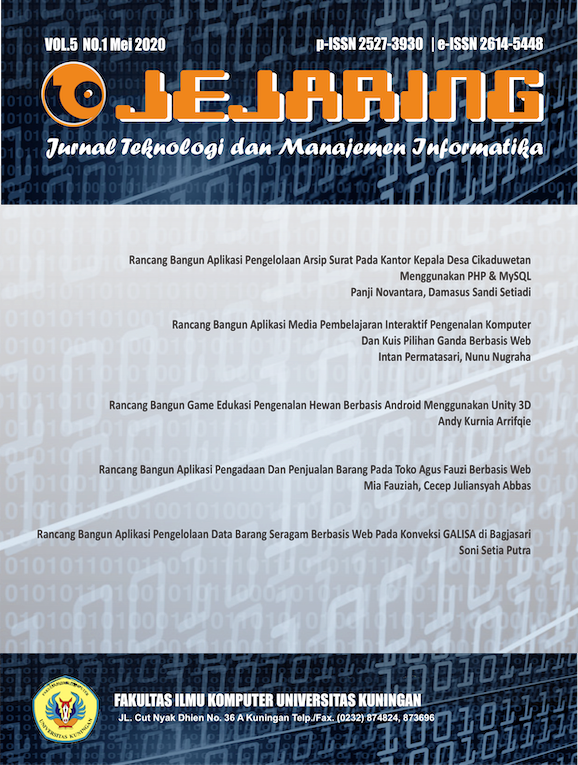IMPLEMENTASI METODE LINEAR CONGRUENTIAL GENERATOR PADA GAME PUZZLE BERBASIS ANDROID
Abstract
Games has become one thing in everyday life. Formerly, the game is only used as a means of entertainment alone, but now the game has become the extent of its function. For example, game can be a mean of learning, business land, and competed as one of the sport by professionals. The development of platform games can also be seen directly by the community, the games only played on computers and consoles in past time, however now it has entered the era of mobile games. Puzzle game is a game that displays pieces of the image where the pieces of the image is scrambled arrangement to provide its own challenge to arrange it. This puzzle game is a game of drawing pieces with the rules of a piece can only be moved by sliding it into empty space. Generally people who play the puzzle, take a long time in completing the game. This is because in the puzzle there is no additional information available to help searching the solution when the process of arranging the pieces into a challenge for those who play it. Images of a puzzle will be scrambled using the Linear Congruential Generator (LCG) method. Linear Congruential Generator using an initial state then with a special formula will generate a pseudo-random number. The initial state used is taken from a variety of sources that are considered quite random. Thus, the Linear Congruential Generator will produce a series of numbers that resemble random numbers. Linear Congruential Generator is widely used today, it eases the implementation and speed as the main factor why Linear Congruential Generator is used.
Keywords : Games, Puzzle Games, Linear Congruential Generator (LCG)
References
Akhmad, Dharma Kasman. 2015. Aplikasi Pemesanan
Tiket Online Berbasis Web &PHP. Cirebon :
CV. ASFA Solution
A.S, Rosa dan M. Salahuddin. (2015). Rekayasa
Perangkat Lunak Terstruktur dan Berorientasi
Objek. Bandung : Informatika Bandung
A.S, Rosa. (2011). Modul Pembelajaran Rekayasa
Perangkat Lunak. Bandung : Modula
Endarmoke,e.(2006). Tesaurus Bahasa Indonesia.
Jakarta: Gramedia
Hakim, Lukmanul.(2008). Rahasia Inti Master PHP
dan MySQLi(improved).
Yogyakarta : Lokomedia
Hariyanto. (2010). Metode Permainan Dalam
Pembelajaran,
http://belajarpsikologi.com/metode-permainandalam-
pembelajaran.html (Diakses pada tanggal
juni 2016)
Jeffry. (2010). Rancangan Bangun Aplikasi Edukasi
Puzzle Pengenalan Tokoh Sejarah Berbasis
Android Dengan Metode Linear Congruential
Generator. Diakses 02 Februari, dari situs
http://www.pelita-informatika.com
Jugiyanto, HM. (2005). Analisis dan Desain.
Yogyakarta : Andi Offset
Kadir Abdul. 2012. Algoritma & Pemrograman
menggunakan Java. Yogyakarta : Andi Offset
Kadir Abdul.2013. Pemrograman Aplikasi Android.
Yogyakarta : Andi Offset
Kustiyahningsih, Yeni. 2011. Pemrograman Basis Data
BerbasisWeb Menggunakan PHP & MySQL.
Jakarta : Graha Ilmu.
Mulyanto, Aunur R. 2008. Rekayasa Perangkat Lunak
Jilid 1. Jakarta : Direktorat Pembinaan Sekolah
Menengah Kejuruan, Direktorat Jendral
Manajemen Pendidikan Dasar dan Menengah,
Departemen Pendidikan Nasional.
Nazaruddin Safaat H. 2012 “Android, Pemrograman
Aplikasi Mobile Smartphone dan Tablet PC
Berbasis Android”, Bandung: Penerbit
Informatika.
Nugroho, Adi. 2010. Rekayasa Perangkat Lunak
Berorientasi Objek Dengan Metode USDP.
Yogyakarta : Andi Offset
Ramadhan, Karli, Astuti Lastri Widya dan Verano Dwi
Asa. (2015). Game Edukasi Tebak Gambar
Bendera Negara Menggunakan Metode Linear
Congruential Generator (LCG) Berbasis
Android. Diakses 07 Februari, dari situs
ejournal.uigm.ac.id.
Sibero, Alexander F.K. 2011. Kitab Suci Web
Programming. Yogyakarta : Mediakom.
Susanto, Ready. (2011). 100 Tokoh Abad Ke-20
Paling Berpengaruh. Bandung : Nuansa.
Utami, Ema.(2008).RDBMS menggunakan MySQL
Server 2000. Yogyakarta : Graha Ilmu
Penulis yang menerbitkan jurnal ini menyetujui persyaratan berikut:
Hak cipta untuk artikel ini ditransfer ke JEJARING jika dan ketika artikel diterima untuk publikasi. Yang bertanda tangan di bawah ini dengan ini memindahkan setiap dan semua hak di dalam dan ke kertas termasuk tanpa batasan semua hak cipta untuk JEJARING. Yang bertanda tangan di bawah ini dengan ini menyatakan dan menjamin bahwa makalah tersebut asli dan bahwa ia adalah pembuat makalah, kecuali untuk materi yang secara jelas diidentifikasi sebagai sumber aslinya, dengan pemberitahuan izin dari pemilik hak cipta jika diperlukan. Yang bertanda tangan di bawah ini menyatakan bahwa ia memiliki kekuatan dan wewenang untuk membuat dan melaksanakan tugas ini. Formulir transfer hak cipta akan dikirim melalui email sebelum artikel dipublikasikan.
Penulis yang sesuai menandatangani dan menerima tanggung jawab untuk merilis materi ini atas nama setiap dan semua penulis bersama. Perjanjian ini harus ditandatangani oleh setidaknya salah satu penulis yang telah memperoleh persetujuan dari rekan penulis jika berlaku. Setelah pengajuan perjanjian ini ditandatangani oleh penulis yang bersangkutan, perubahan kepengarangan atau dalam urutan penulis yang tercantum tidak akan diterima.

